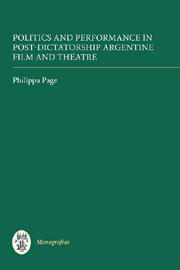Book contents
- Frontmatter
- Contents
- List of Illustrations
- Dedication
- Acknowledgements
- Introduction
- ‘Theatre[s] of Cruelty’ and Politics of Performance in the Work of ‘Teatrista’ Eduardo Pavlovsky and Filmmaker Fernando E. Solanas
- De-mythifying the Postmodern ‘Opium of the People’: Theatre and Cinema versus Television
- ‘Metáforas del Fracaso’ or ‘a Family Romance’? Resuscitating Aesthetic Lineages
- Biodramas/Biography/Biopolitics:Projects of ‘Convivencia’ in New Argentine Cinema and Theatre
- Conclusion
- Filmography
- Bibliography
- Index
Conclusion
Published online by Cambridge University Press: 05 February 2013
- Frontmatter
- Contents
- List of Illustrations
- Dedication
- Acknowledgements
- Introduction
- ‘Theatre[s] of Cruelty’ and Politics of Performance in the Work of ‘Teatrista’ Eduardo Pavlovsky and Filmmaker Fernando E. Solanas
- De-mythifying the Postmodern ‘Opium of the People’: Theatre and Cinema versus Television
- ‘Metáforas del Fracaso’ or ‘a Family Romance’? Resuscitating Aesthetic Lineages
- Biodramas/Biography/Biopolitics:Projects of ‘Convivencia’ in New Argentine Cinema and Theatre
- Conclusion
- Filmography
- Bibliography
- Index
Summary
In the introduction to this study I suggested, with reference to the work of Jacques Derrida (1980) and Hayden White (2003), that genre was by no means a redundant concept within the context of postmodernism, rather that it should be reconceived as a contingent or performative construct which is symptomatic of the prevailing context. Certainly the reflexivity of many of the plays and films discussed in this book is evidence enough of their preoccupation with both generic boundaries and the boundaries of the aesthetic in more general terms, which maintain art as a separate category in relation to the political, the social and the economic. This sense of relativity accorded to the concept of genre means that the edges of genre blur and it takes on a newfound fluidity in relation to neighbouring genres (or media/ art forms). The fact that I systematically place theatre and cinema's borrowings from other genres/media/art forms in dialogue with their political and social engagement, underpins the idea that aesthetic categories are historically contingent constructs relative to their socio-political context. What I would now like to consider, as a way of bringing together the various threads running through this investigation, is how discussion of reflexivity and the performativity/contingency of genre illuminates certain other processes of identity construction at large: namely social, cultural and national identities in relation to Argentina's experience of (post)modernity.
In chapter 1, I cited Eduardo Pavlovsky's idea that '[n]o es sólo cultura la producción de una obra de arte, sino también la producción de subjetividad (2001: 157).
- Type
- Chapter
- Information
- Politics and Performance in Post-Dictatorship Argentine , pp. 161 - 169Publisher: Boydell & BrewerPrint publication year: 2011

